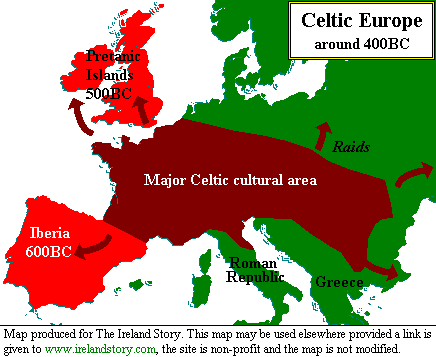| Modern day Celts |
 |
| Source |
The Celts are best known for their early use of iron in conquest and dominion. It was because of their military dominance that they were able to spread over most all of today's Europe. The difference between the Celts and other dominant military forces, though, was that they had very limited central leadership. There was no one set king, but there were rí túaithe (leader of one kingdom), ruiri (oversaw the rí túaithe), and rí ruirech (kings of provinces). Even this source of centralized leadership ended up being a hassle, as the constant skirmishes for power between kings made way for constant changes in the heads. The Celts managed to stay conglomerated as one through these difficult circumstances by their culture alone. A common language worked as a glue to keep the area stuck together.
 |
| The main hero of the Ulster Cycle |
The frequent references to the bards and druids in the cycle suggest that the Celts put a particular emphasis on education. The social classes are believed to consist of three basic types: The warriors, the druids and bards (educated populace), and everyone else. This is interesting because it would be the druids and bards that did most of the oral influence and knowledge handling. There was enough emphasis on this class of "scholars" that they were included in the historical text of the area as a large part of the celebrations and doings around that time. The bards and their poems set a originality to the area that allowed it to flourish and, even to this day, leave remnants of Celtic culture that many still cling to as their own in modern-day Ireland. The most evident are the heavy Goidelic roots in today's Irish language. It's always interesting to me that a culture can put such a mark on a place that no matter what hands it falls into (even a traditionally strong Roman culture!), the Celtic culture was tough enough to weather the storm and continue.
Sources: 1, 2, 3
Oh dear, this post just made me lose a half hour of my life to looking up Celtic languages. The Welsh language, by the way, has one of my favorite consonant sounds ever. It is voiceless alveolar lateral fricative, which is a fancy way of saying that you pronounce it by positioning your tongue like you were saying an "l," then blowing out the sides. We don't have this sound in English, so when we borrow words from Welsh, it either turns into a plain "l" sound, like in the last name Lloyd, or an "fl" sound, like in the band Pink Floyd.
ReplyDeleteI absolutley love the Irish culture, this was actually where i was hoping to get called to serve before i put my papers in. That was a great post. There so many great things to learn in regards to the language. Great stuff
ReplyDeleteWow Diane that's super interesting. Ryan I followed your link to the Ulster Cycle page and I didn't realize that the book was recorded orally for three centuries-- that's so insane to me! I also didn't realize the romans had any connection to the celts, but based on the fact that the Ulster Cycle features chariot races, it seems to me the Romans had some influence. I wonder if the creation of the Ulster Cycle was influenced at all by the Romans. Maybe it was a way for the celts to assert their own identity?
ReplyDeleteOk, so maybe it's because I'm tired and dillusional- but the part where Ryan was talking about how because the celts were separated by water reminds me of how certain parts of the country we speak different kinds of english. Almost so different the same language spoken by a certain group of people in the US is not understood by other groups of people. We're not separated by water- but somehow a couple thousand miles does the trick.
ReplyDelete